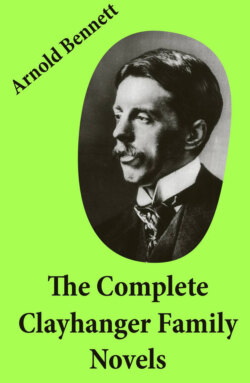Читать книгу The Complete Clayhanger Family Novels (Clayhanger + Hilda Lessways + These Twain + The Roll Call) - Arnold Bennett - Страница 119
На сайте Литреса книга снята с продажи.
Five.
ОглавлениеHe stood at the drawing-room bay-window (of which each large pane had been marked with the mystic sign of a white circle by triumphant glaziers), and looked across the enclosed fragment of clayey field that ultimately would be the garden. The house was at the corner of Trafalgar Road and a side-street that had lobbied cottages down its slope. The garden was oblong, with its length parallel to Trafalgar Road, and separated from the pavement only by a high wall. The upper end of the garden was blocked by the first of three new houses which Osmond Orgreave was building in a terrace. These houses had their main fronts on the street; they were quite as commodious as the Clayhangers’, but much inferior in garden-space; their bits of flower-plots lay behind them. And away behind their flower-plots, with double entrance-gates in another side street, stretched the grounds of Osmond Orgreave, his house in the sheltered middle thereof. He had got, cheaply, one of the older residential properties of the district, Georgian, of a recognisable style, relic of the days when manufacturers formed a class entirely apart from their operatives; even as far back as 1880 any operative might with luck become an employer. The south-east corner of the Clayhanger garden touched the north-west corner of the domains of Orgreave; for a few feet the two gardens were actually contiguous, with naught but an old untidy thorn hedge between them; this hedge was to be replaced by a wall that would match the topmost of the lobbied cottages which bounded the view of the Clayhangers to the east.
From the bay-window Edwin could see over the hedge, and also through it, on to the croquet lawn of the Orgreaves. Croquet was then in its first avatar; nothing was more dashing than croquet. With rag-balls and home-made mallets the Clayhanger children had imitated croquet in their yard in the seventies. The Orgreaves played real croquet; one of them had shone in a tournament at Buxton. Edwin noticed a figure on the gravel between the lawn and the hedge. He knew it to be Janet, by the crimson frock. But he had no notion that Janet had stationed herself in that quarter with intent to waylay him. He could not have credited her with such a purpose. Nor could his modesty have believed that he was important enough to employ the talent of the Orgreaves for agreeable chicane. The fact was that Janet had been espying him for a quarter of an hour. When at length she waved her hand to him, it did not occur to him to suppose that she was waving her hand to him; he merely wondered what peculiar thing she was doing. Then he blushed as she waved again, and he knew first from the blood in his face that Janet was making a signal, and that it was to himself that the signal was directed: his body had told his mind; this was very odd.
Of course he was obliged to go out; and he went, muttering to himself.
